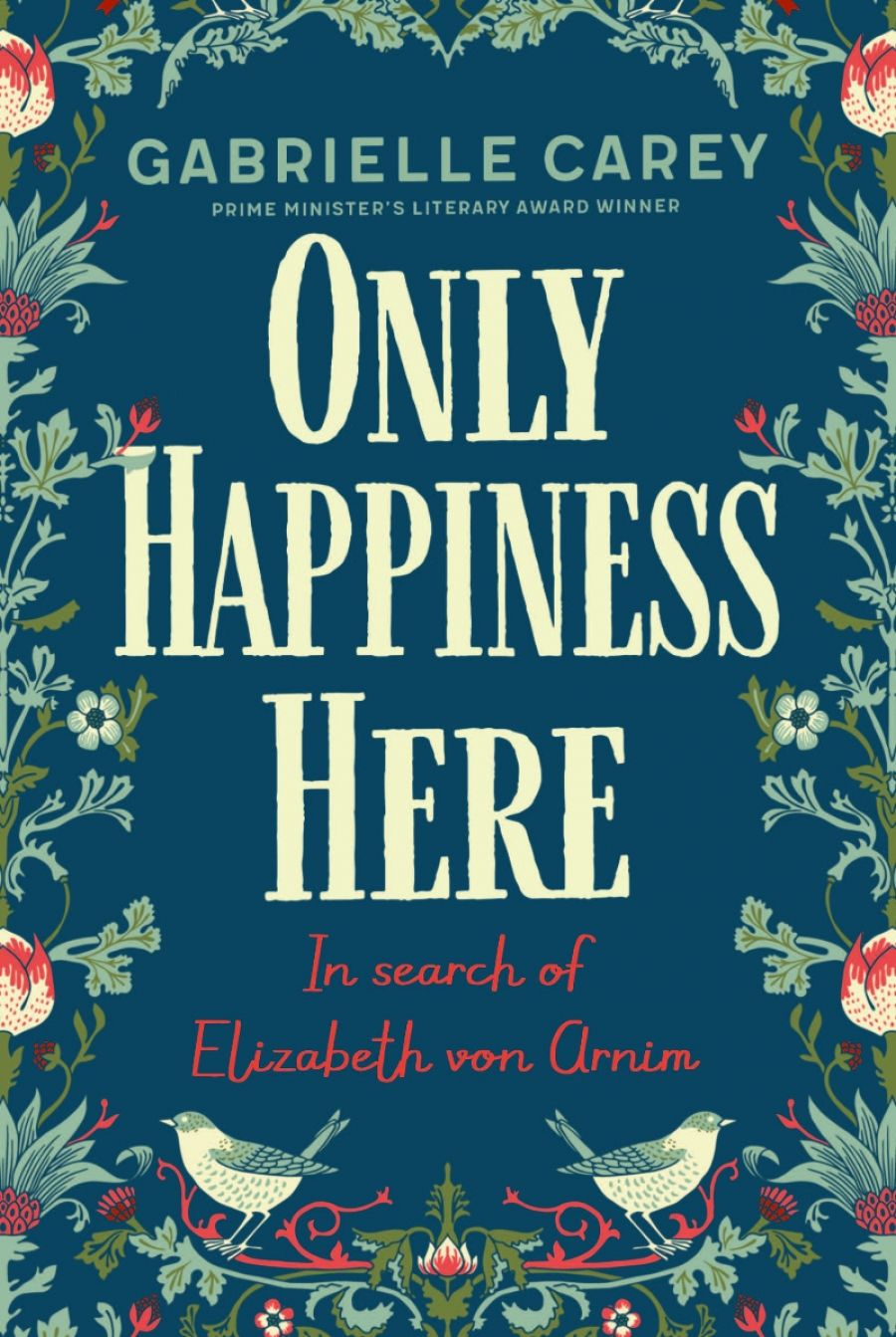
- Free Article: No
- Contents Category: Literary Studies
- Review Article: Yes
- Article Title: Writing happiness
- Article Subtitle: A lively look at Elizabeth von Arnim
- Online Only: No
- Custom Highlight Text:
How could she write happiness so well? For Gabrielle Carey, this is the driving question in her search for Elizabeth von Arnim (1866–1941), an Australian-born writer of more than twenty bestselling satirical novels who married a German count and then an English lord, bore five children, lived all over Europe, and hosted the British intellectual and literary élite at her Swiss chalet. Von Arnim’s novels are still available in many editions. A literary celebrity in the early twentieth century, she retains a loyal readership but has been largely forgotten by literary history. After losing ‘faith in the very idea of happiness, let alone the pursuit of it’ in a deep personal crisis, Carey turns to von Arnim as a guide to restore her faith, following the author’s dictum that happiness is ‘attainable by all except the unworthy and deluded’.
- Grid Image (300px * 250px):

- Book 1 Title: Only Happiness Here
- Book 1 Subtitle: In search of Elizabeth von Arnim
- Book 1 Biblio: University of Queensland Press, $32.99 pb, 250 pp
- Book 1 Readings Link: booktopia.kh4ffx.net/DDQEo
Von Arnim’s novels aren’t all about happiness. Her great subject – the plight of women seeking fulfilment in traditional marriage and motherhood – was apparent in her first and most popular book, Elizabeth and Her German Garden (1898), a thinly veiled account of her life as a Prussian countess on a remote estate in northern Germany. The runaway success of her début sparked a series of ‘Elizabeth’ novels in diary form before, with growing confidence, von Arnim left her light-hearted literary alter ego behind. However, Carey is right when she says that few writers have such a talent for writing happiness, joy, and sheer fun.
In Only Happiness Here, Carey sets out to relate von Arnim’s biography and to distil nine ‘principles of happiness’ from her life and works, which form the chapters of the book. Most of these principles are well established in the booming field of happiness studies – a field Carey claims she has not found very useful for increasing her own – and include such staples as ‘Freedom’, ‘Nature and Gardens’, ‘Physical Exercise’, ‘A Kindred Spirit’, ‘Leisure’, and ‘Creativity’. However, Carey is not just a biographer but also an essayist and memoirist. Moving Among Strangers (2013), a portrait of her late mother, won the 2014 Prime Minister’s Award for Non-Fiction. Only Happiness Here is at its strongest when Carey moves, with great candour, between von Arnim’s life and her own. This works well for the first half of the book, not least because von Arnim’s ‘Elizabeth’ diaries include musings on reading, seclusion, women’s rights, and the joys of gardening. In her chapter on ‘Privacy’, Carey deftly weaves together the spectre of domestic violence in von Arnim’s life and novels with her need for solitude, and the challenges she faced as a writer and wife. Carey discusses von Arnim’s decision to write under the pseudonym of ‘Elizabeth’ (she later adopted the name of her first heroine for herself) and concludes the chapter by drawing parallels between her own traumatic experience of identity theft and von Arnim’s shock at seeing her husband arrested on charges of fraud (of which he was later cleared). The easy back and forth between the novels, biography, and memoir makes for an interesting and illuminating read and models the ways in which many of us make friends with our favourite authors: by comparing experiences and finding companionship in literary characters. We read to elucidate our own life. Sadly, given that Only Happiness Here was inspired by the pleasure Carey finds in reading a fellow writer of autobiographically inflected fiction, her exploration of the nexus between reading, writing, and the art of living is not always fully developed. Her ‘principles of happiness’ remain at times a little vague.
Ironically, the chapter on ‘Sunshine’, by far the longest in the book, outlines the most tempestuous years in von Arnim’s life, around World War I: her stormy relationship with H.G. Wells, the estrangement and death of her teenaged daughter Felicitas in war-time Germany, von Arnim’s disastrous second marriage to Sir Francis Russell (brother of Bertrand Russell), and her drawn-out affair with a much younger lover. This period also inspired von Arnim’s dark masterpiece, Vera (1921), a modern Gothic tale of domestic abuse. Carey finally returns to her theme of sunshine with a discussion of von Arnim’s most light-hearted book, The Enchanted April (1922), which has been adapted for the screen. However, for almost a hundred pages Carey traces the well-known facts of von Arnim’s life and offers short readings of the novels while personal memories and broader reflections on happiness recede into the background.
Such a decisive turn towards biography means that Only Happiness Here invites the comparison with the existing biographies on von Arnim’s life. Carey weighs in on the question as to whether von Arnim’s relationship with H.G. Wells was physical (the evidence strongly suggests it was), but her speculation that von Arnim’s estrangement from Felicitas involved a concealed teenage pregnancy lacks evidence. It mars the readerly pleasure to see several German words misspelt. However, scholars will appreciate Carey’s archival work, which has unearthed Australian reviews proving that von Arnim’s identity was revealed earlier than we thought. Carey concludes with a walk around Kirribilli in a welcome attempt to solve the mystery of von Arnim’s exact birthplace in Sydney.
Readers of memoir and Elizabeth von Arnim’s admirers will enjoy this lively and well-written expedition into the life and works of a much-loved writer, and take it as a welcome invitation to (re)discover her novels in that ever-pleasurable pursuit of reading as a form of happiness in itself.


Comments powered by CComment